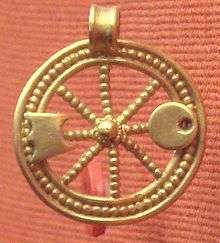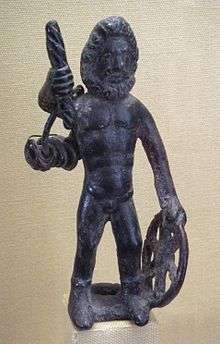Litavis
Litavis—also known as Litauis,[1] Litaui, Litauia,[2][3] and Llydaw[4]—is a goddess in Celtic mythology worshiped by the ancient Gauls. Her name is found in inscriptions found at Aignay-le-Duc and Mâlain of the Côte-d'Or, France, where she is invoked along with the Gallo-Roman god Mars Cicolluis in a context which suggests that she might have been his consort.[5] Also, a Latin dedicatory inscription from Narbonne (which was in the far south of Gaul), France, bears the words “MARTI CICOLLUI ET LITAVI” ("To Mars Cicolluis and Litavis").[2][3]
Etymology
Letavia or Letauia may be derived from a Proto-Indo-European root *peltHa- "to spread out flat", via a zero-grade, suffixed formation, *PltHa-wiH, meaning "The Broad One".[6] The name may thus be comparable to the Vedic earth goddess “Prthvi” and the Greek place name Plataia, suggesting that Letavis is an earth goddess or divinisation of the landscape.
Brittany
Brittany is standardly referred to as Llydaw in Modern Welsh, echoing the use of the name Letavia for Brittany (or part of it) In Latin texts. The Chronicle of Robert de Torigni states of the peninsular, quae antiquitus letauia sive armorica uocata est (“which was anciently called Letavia or Armorica”).[1][5] Likewise, the Life of Saint Goulven refers to partes letaniae quae pars est armoricae siue britanniae minoris ("the regions of Letania, which is a part of Armorica or Little Britain"). This latter passage displays the common confusion of the letter n with u or v in medieval manuscripts.[1] "Letavia" may be derived from "Litavis", so the place-name would mean "Land of Litavis".
References
Specific
- 1 2 3 Fitzpatrick-Matthews, Keith. "Brittany/Llydaw," The Cyberhome of Keith Fitzpatrick-Matthews. 26 May 2007.
- 1 2 Koch, John T. "Ériu, Alba, and Letha: When Was a Language Ancestral to Gaelic First Spoken in Ireland?" Emania: Bulletin of the Navan Research Group 9 (1991): 17–27.
- 1 2 Gwinn, Christopher. "Re: Litavi." LISTSERV 15.0: OLD-IRISH-L Archives. 31 Dec. 2000, 13:48:19 −0500. L-Soft. 26 May 2007 <https://listserv.heanet.ie/cgi-bin/wa?A2=ind0012&L=old-irish-l&P=10754>.
- ↑ Anwyl, Edward, M.A.. Celtic Religion in Pre-Christian Times Archived 2007-09-27 at the Wayback Machine.. London: Archibald Constable & Co. Ltd., 1906. “Chapter 5: The Humanized Gods of Celtic Religion” <"Archived copy". Archived from the original on 2007-09-27. Retrieved 2007-09-27. >.
- 1 2 Evans, Dyfed Lloyd. "Litavis: A Gaulish Goddess (She Who Feeds)." Celtnet: Nemeton. 26 May 2007 <"Archived copy". Archived from the original on 2007-09-27. Retrieved 2007-09-27. >.
- ↑ Koch, John, "Celtic Culture: A Historical Encyclopedia", ABC-CLIO, 2006, p. 1159
General
- “Litavia” — article in Jones’ Celtic Encyclopedia by Mary Jones
- “Litavis” — Litavis in the will of Lingon (in French); automatic Google translation into English
- Etymological translations of “Litanus,” “Litaui/Litavi,” “Litauis/Litavis,” etc. by Patrick Cuadrado (in French); automatic Google translation into English

